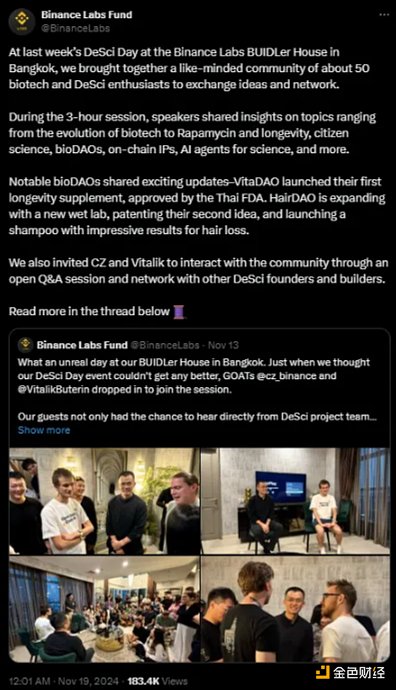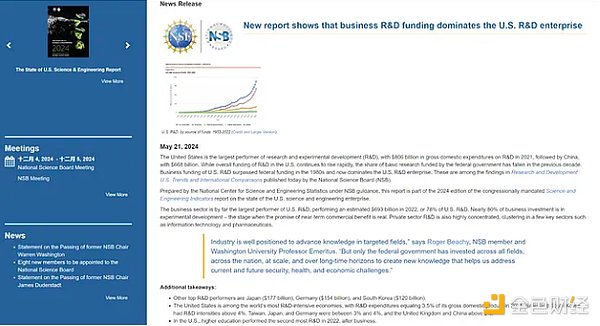Author: Ac-Core, Researcher at YBB Capital
Key Points
The rise of DeSci (Decentralized Science) is largely due to Binance Labs' investment in BIO Protocol, CZ's statement on the new direction of biotechnology, and CZ's discussion with Vitalik on DeSci. a16z led the investment in the DeSci project AmionChain.
Compared to other meme-driven fields such as zoos, artificial intelligence, and art, DeSci requires stronger narratives and personal support. It also has tremendous potential to reach a wider audience.
From a practical perspective, the current economic scale of DeSci is insufficient to sustain research funding. DeSci is still in the early stage of the "market dream rate", and speculative activities driven by hype are indispensable.
1. Background
1.1 What is DeSci?
A more official explanation: DeSci (Decentralized Science) aims to use Web3 technology to build fair and just public research infrastructure, focusing on solving issues such as peer review, research funding, IP management, data transparency, and audit mechanisms.
A simpler explanation is: DeSci is bringing the pure speculation of the crypto world into the non-speculative field of scientific research. However, DeSci is not a new concept that emerged this year. VitaDAO, which focuses on funding and promoting early longevity research, was established in 2021 and even received investment from the globally renowned pharmaceutical company Pfizer. However, DeSci has always been a slow-moving field until recently, when Binance Labs announced its investment in BIO Protocol, and CZ and Vitalik discussed DeSci, bringing the field back into the public eye.
1.2 The Birth of the Trend
1. Binance Labs Exclusively Invests in BIO Protocol:
BIO Protocol can be seen as a scientific project crowdfunding platform, raising funds through token sales to support and promote biotechnology projects. Intellectual property is represented by IPT (Intellectual Property Token) of the Molecule Protocol, which is shared by participants.
BioDAO supplements its funding through intellectual property and product sales revenue to fund future R&D projects. Binance Labs described BIO as the "on-chain science Y Combinator". Currently, the valuation or market capitalization of the top 100 Y Combinator startups exceeds $100 billion, including companies such as Airbnb, Coinbase, Stripe, and Reddit.
2. CZ's New Focus on Biotechnology and Discussion with Vitalik on DeSci:
During the 2024 Binance Dubai Blockchain Week, CZ stated in his first speech after the press conference that "I am currently focused on two things: Giga Academy and investments. My investments are mainly focused on blockchain, artificial intelligence, and biotechnology." Later, CZ attended Binance's DeSci Day event in Bangkok and discussed DeSci with Vitalik, which generated great market attention and led to a significant price increase in the tokens of various DeSci projects.
3. a16z Leads Investment in DeSci Project AmionChain:
Recently, AmionChain announced that it has raised $5 million in a seed round led by a16z, including previous investments from Cercano and other private equity funds, bringing the total funding of AmionChain to $7.8 million. AmionChain's vision is to build a decentralized "biobank" on the second layer, where researchers can easily find and access samples, while patients retain control and are compensated for the use of their data.

Source: X(@BinanceLabs)
2. The Real Demand and Real Use Cases of DeSci
2.1 The Reality of DeSci: The Funding Needs of Scientific Research
According to the 2024 report from the National Science Foundation (NSF) and the National Center for Science and Engineering Statistics (NCSES), U.S. research spending is expected to reach $710 billion in 2023. In 2022, R&D spending approached $7 trillion, with the majority coming from private sector investment, particularly in sectors like information technology and pharmaceuticals, accounting for around 78% of total R&D spending.
In 2021, the countries with the highest R&D spending after the U.S. and China were Japan ($177 billion), Germany ($154 billion), and South Korea ($120 billion). In 2021, U.S. R&D spending accounted for 3.5% of GDP, while Israel and South Korea exceeded 4%, Taiwan, Japan, and Germany were between 3%-4%, and the U.K. and China were above 2%. In 2022, the U.S. ranked second in higher education R&D spending, behind only business enterprises. Funding for life science research is the highest among all scientific and engineering fields, reaching $42 billion (44% of the total), primarily from the U.S. Department of Health and Human Services (data can be found in the extended links).

Source: See Extended Link 1
In 2023, China's R&D spending exceeded 3.3 trillion yuan (about $458.5 billion), an 8.1% year-on-year increase. Of this, basic research investment was 221.2 billion yuan, up 9.3%. Compared to previous years, China has maintained a relatively high growth rate, especially in high-tech and basic research fields, reflecting the strong driving force of the "Science and Technology Superpower" strategy (data in Extended Link 2).
Comparison of R&D spending growth: China's R&D spending is growing rapidly, especially in the field of basic research, reflecting China's investment in technological innovation and advanced scientific fields. While the U.S. invests more in absolute terms, its growth rate is more stable, focusing on long-term technological progress in its areas of sustained advantage.
From the perspective of DeSci's practical application, it is still in the "meme" narrative stage and has not directly driven technological progress. Whether it is donation-driven empathy or speculative trading-driven market liquidity, the current economic scale is still insufficient to support the huge funding required for scientific research. Therefore, DeSci is still in the early stage of the "market dream rate". In the future, for DeSci to truly take off, it needs to meet regulatory requirements and gain the continued support of the big players.
2.2 A Real Academic Finance Case of DeSci? The LK-99 Room Temperature Superconductor Incident in South Korea

Image Source: Taj Quantum - Official Website of Taj Quantum, USA
2023 has been dubbed the "year of room temperature superconductors" mainly due to multiple studies claiming to have discovered room temperature superconducting materials, which have sparked widespread attention in the global scientific community. However, as the research progressed, these findings were found to have major problems, even leading to academic scandals.
The incident was triggered by a paper published in Nature by University of Rochester physicist Ranga Diaz, claiming the discovery of a material that can achieve superconductivity at room temperature. This discovery was initially hailed as a breakthrough achievement, as the emergence of room temperature superconductors could fundamentally change energy transmission, medical equipment, and electronics. Superconductors typically require extremely low temperatures (below -196°C), so room temperature superconductors have long been a goal for the scientific community. However, Diaz's research faced massive skepticism from the beginning, especially given that his academic reputation had already been questioned in 2020 due to similar research.
In 2020, Diaz gained widespread attention for a paper on room temperature superconductors, but that paper was retracted by Nature two years later. Nevertheless, Diaz published a similar research paper in 2023, reigniting people's interest. However, many of his peers accused him of data manipulation and even plagiarism from his doctoral thesis. Prominent media outlets such as The Wall Street Journal and Science magazine conducted investigations, exposing problems with his research. The University of Rochester also launched multiple internal investigations, ultimately confirming "data reliability issues" in Diaz's papers, leading to him being relieved of his laboratory and student supervision duties. In November 2023, Nature formally retracted Diaz's latest paper on room temperature superconductors.
The full extent of the scandal is beginning to surface. According to the investigation team of Nature News, Diaz's team members did not observe the key superconducting phenomenon of the "Meissner effect" in the experiments, but were required to quickly submit the initial draft of the paper to Diaz. Many graduate students had doubts about some of the data in the paper, but under the authority and pressure of the professor, they did not publicly question these issues. As more and more reviewers and experts begin to carefully examine the experimental data, they find that these data are likely to have been manipulated. Although Diaz's first paper was severely criticized, he claimed to have discovered room-temperature superconductivity in another material - a compound of lutetium and hydrogen (LuH). However, the measurement data of this research are also full of problems, and many students point out that there are systematic errors in the experiment. Some even feel that they are "self-deceiving". Despite the growing criticism, Diaz continued to publish papers, but 8 out of 11 co-authors ultimately requested to withdraw the paper. This series of academic scandals not only seriously damaged Diaz's reputation, but also affected the entire scientific community. The career prospects of many young scientists who participated in these studies have become uncertain, and the trust in academia has also been damaged. Paul Canfield, a physicist at Iowa State University, commented that "this scandal has damaged the careers of young scientists, especially those in the field of superconductivity." At the same time, another heavyweight figure in the field of room-temperature superconductivity - the LK-99 team from South Korea - has also become embroiled in similar controversies. Although they claimed to have discovered a new "room-temperature superconductor" called PCPOSOS in 2024, many in the scientific community are skeptical about the authenticity of their research. The data presented by the team at academic conferences are similar to LK-99's previous research, lacking sufficient verification. After the announcement of the breakthrough in superconductivity technology, some South Korean stocks related to superconductivity attracted a large number of investors. Prices of small Korean companies such as Duksung Co. and Sunam Co. hit the daily limit for three consecutive days, with gains of up to 30%. Sunam Co. soared about 260% in the past six trading days, while Duksung Co. rose 170%. Mobiis Co. rose 30% on Thursday, and Shinsung Delta Tech Co. once rose 21%, hitting a new high. Subsequently, the Verification Committee of the Korean Superconductivity Society stated in its investigation that LK-99 did not exhibit the Meissner effect and could not prove that it was a superconductor. This news triggered fluctuations in the prices of Chinese superconductivity stocks, with Farsoon and Zhongfu Industry experiencing significant declines. The former is not involved in superconductivity technology, while the latter only provides space and equipment support. At the same time, the stock prices of US superconductivity companies fell 29%, and Sumitomo Electric also fell due to poor profitability.DeSci may have greater potential to break out of the niche market: Although the PVP market is highly competitive, if there are well-known figures from outside the current circle with a "scientific" background who utilize the DeSci narrative for fundraising or donations, it may gain more attention. Similar to the core logic of purchasing a rare edition of the US Constitution through <$PEOPLE> crowdfunding, embarking on a <$DOGE> moon mission with Elon Musk, and auctioning Beeple's "Everydays: The First 5000 Days" for $69 million at Sotheby's, DeSci has a comparable marketing potential, comparable to Jia Yueting's attempt to launch a car in the crypto field using a PowerPoint presentation.







